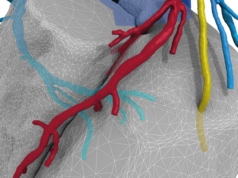Amaranth Medical provided an update on its sirolimus-eluting bioresorbable scaffold products during a satellite symposium at EuroPCR (22 May—25 May, Paris, France), including Magnitude (98 microns) and Aptitude (115 microns).
Clinical device success was high at 97.3% for the 70 patients in RENASCENT III, an international, multicentre study of Magnitude. An interim analysis of 48 patients nine months following their procedure revealed a low rate of major adverse cardiac events (MACE; 6.3%) and a binary restenosis rate of 7.9%. To date, there have been no reported incidence of scaffold thrombosis. Strut apposition and coverage was present in the great majority (97%) of struts analysed by optical coherence tomography (OCT) in the patients implanted with Magnitude.
Alaide Chieffo (Ospedale San Raffaele, Milan, Italy), who presented the data at the symposium, says: “These RENASCENT III results are early in the patient follow-up window. Additional, larger clinical studies would be needed to confirm these findings. Even so, they are promising and speak to the capabilities of the Amaranth polymer technology to develop scaffolds that are thin and strong enough to rival metal stents.”
The symposium also included a presentation and discussion of the efficacy and safety findings from the 60-patient, multicentre, international RENASCENT II study of Aptitude, a scaffold with a strut thickness of 115 microns. As previously reported, at nine months following implant, RENASCENT II patients showed a high clinical device success rate (98.3%) and no cases of restenosis or scaffold thrombosis. At nine months, OCT analysis showed nearly complete strut coverage (97.0%) and a low MACE rate of 3.4% (two non-Q wave myocardial infarctions related to non-target lesions). Chieffo presented new interim two-year follow-up results during the EuroPCR symposium, which show no additional MACE events and no incidence of scaffold thrombosis. The CE Mark for Aptitude is expected to be received in this year.
Included in the company’s update were new details about the 85 micron Defiance scaffold, which is comparably sized to market-leading drug-eluting stent without the risks associated with a permanent implant. When a clinical study of Defiance commences in 2019, according to a press release, it will have the thinnest struts of any bioresorbable scaffold ever tested in clinical development.
Antonio Colombo (Ospedale San Raffaele, Milan, Italy) co-principal investigator of the RENASCENT studies, comments: “The prospect of a viable bioresorbable scaffolds with 85 micron struts —as thin as a drug-eluting stent—is unthinkable with the limitations of most polymer production techniques. If Defiance produces clinical results comparable to Amaranth’s other pipeline products, it could be a truly unique offering.”












